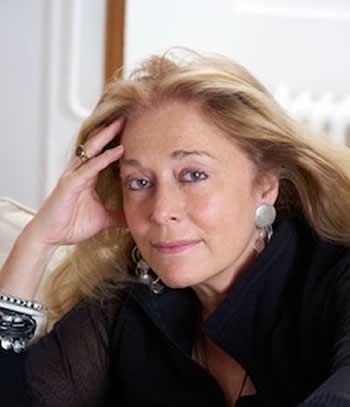Jorie Graham
The Ellen Robbins Poetry Forum
Spring 2013 ~ JORIE GRAHAM

Thursday, April 11, 2013
10:10 a.m. College Lounge
Vanderlyn Hall
Author of numerous collections of poetry including “Selected Poems: 1974-1994” which won the 1996 Pulitzer Prize for Poetry.
With her many collections of poetry, it has been said that Jorie Graham has invented a new poetic language – at once lyrical and analytical, sensuous and philosophical. Rejecting the conventional lyric, Graham creates poems that range across the page and across the human experiences, dramas of faith, perception and emotion.
She is currently the Boylston Professor of Rhetoric and Oratory at Harvard University. She served as the American Chancellor of American Poets from 1997 to 2003.
The following is from Jorie Graham's website:
Jorie Graham
Pulitzer Prize-winning Poet
“One of the most intelligent poets in the language . . . [Graham] is like no one else, neither in her rhythms nor in her insistence on opening up, scrutinizing, and even reversing our experience of time and space.” —Times Literary Supplement
“Graham stands among a small group of poets (Dickinson, Hopkins, Moore), whose styles are so personal that the poems seem to have no author at all: they exist as self-made things.” —The Nation
"The world champion at shot-putting the great questions." —LA Review of Books
Jorie Graham is the author of numerous collections of poetry, including the Forward Prize-winning and T.S. Eliot Prize-nominated PLACE (Ecco, 2012), Sea Change (2008), Overlord (HarperCollins, 2005); Never (HarperCollins, 2002); Swarm (2000); The Errancy (1997); The Dream of the Unified Field: Selected Poems 1974-1994, which won the 1996 Pulitzer Prize for Poetry; Materialism (1993); Region of Unlikeness (1991); The End of Beauty (1987); Erosion (1983); and Hybrids of Plants and of Ghosts (1980). She has also edited two anthologies, Earth Took of Earth: 100 Great Poems of the English Language (1996) and The Best American Poetry 1990.
With her many collections of poetry, it is said that Jorie Graham has invented a new poetic language—at once lyrical and analytical, sensuous and philosophical, shifting between acceleration and breaking. Rejecting the conventional lyric, Graham creates poems that range across the page and across human experiences, dramas of faith, perception, and emotion. Her poems press language to the breaking point, but out of the ruins emerges a startling new world. As she puts it: “the infinite variety of having once been, / of being, of coming to life, right there in the thin air.”
Graham's many honors include a John D. and Catherine T. MacArthur Fellowship and the Morton Dauwen Zabel Award from The American Academy and Institute of Arts and Letters. She has taught at the University of Iowa Writers' Workshop and is currently the Boylston Professor of Rhetoric and Oratory at Harvard University. She served as a Chancellor of The Academy of American Poets from 1997 to 2003. She lives in Cambridge, Massachusetts and in the Litchfield Hills of Connecticut.
About P L A C E (2012)
You need to watch a Graham poem closely — it's going to move quietly, subtly, so slowly it may even seem, at first, boring. But there's a lot going on there if you can bring down your heart rate to the poems' trance-like pace. For Graham, observing the movements of her mind and the action in the world are the same thing. In these mature poems, memories come alive with a vividness you could trip over: "I am the only one who ever lived who remembers / my mother's voice in the particular shadow / cast by the skyfilled Roman archway," she writes. Elsewhere, the present turns ethereal as, for instance, a dog hit by a car becomes "the loved still-young creature being carried now onto the family lawn." At the end of each of these winding, harrowing poems, you always end up having inched miles from where you started. Graham is in top form. —NPR
In P L A C E, Graham explores the ways in which our imagination, intuition, and experience—increasingly devalued by a culture that regards them as “mere” subjectivity—aid us in navigating a world moving blindly towards its own annihilation and a political reality where the human person and its dignity are increasingly disposable. Throughout, Graham seeks out sites of wakeful resistance and achieved presence. From the natural world to human sensation, the poems test the unstable congeries of the self, and the creative tensions that exist within and between our inner and outer landscapes—particularly as these are shaped by language.
Review of PLACE in the LA Review of Books
About SEA CHANGE (2008)
The New York Times said that "[Jorie] Graham's poetry is among the most sensuously embodied and imaginative writing we have," and this new collection is a reminder of how startling, original, and deeply relevant her poetry is. In Sea Change, Graham brings us to the once-unimaginable threshold at which civilization as we know it becomes unsustainable. How might the human spirit persist, caught between its abiding love of beauty, its acknowledgment of damage done, and the realization that the existence of a "future" itself may no longer be assured? There is no better writer to confront such crucial matters than "our most formidable nature poet" (Publishers Weekly). As formally gorgeous and inventive as anything Graham has written, Sea Change is an essential voice speaking out for our planet and the world we have known.
About OVERLORD (2005)
In her previous books, including the Pulitzer Prize-winning The Dream of the Unified Field (1995), Graham explores the divide between perception and reality. In her stunning ninth collection, she is still an agile metaphysician, but her poetic self now kneels with her face in her hands, humbled by illness, war, and the ravaged earth. Forthright, compassionate, and ironic, Graham has crafted poems of lyrical steeliness and cauterizing beauty. The book's title refers to "Operation Overlord," the Allied offensive that culminated in the landing on Normandy's Omaha Beach, and that, for Graham, inspired exquisite and devastating tributes to soldiers. She then links the past to the grim post-9/11 present, where one god is pitted against another, a taxicab ride reveals a tangle of cultural conflicts and personal tragedies, and environmental decimation looms. Graham writes with breathtaking precision about the helplessness one feels in the face of suffering, but because "we cannot ask another to live / without hope," and because the poet's "great desire to praise" remains undaunted, Graham takes up the pen not only to eulogize but also to express "gratitude for the trees / and the birds they house." —Donna Seaman, Booklist
Media Gallery
Jorie Graham reading at the 2006 Dodge Poetry Festival
Conversation: Jorie Graham with Michael Silverblatt, May 20, 1999




